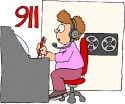Becoming a 911 Operator

You and your friends probably know that when someone is injured or in danger or otherwise needing assistance, they can call 911 and someone will come to help. It might be the police, paramedics in an ambulance or firefighters in a fire truck. The people who answered the phone and sent the help will not be there, however. Emergency operators for the 911 system don’t respond to crises themselves, but they work in call centres to help organize help for whatever people need.
Imagine dealing with emergencies without a 911 system. If you saw a fire, you would have to call the fire department, but if you saw a store being robbed, you would have to call the police. A bad accident might require a call for an ambulance, and other situations might need all three. That could be very confusing and waste time as people tried to decide what number to call. The job of 911 operators helps to make the process easier.
Basically, 911 operators take emergency calls and pass on the information to the right people. Sending the best help involves finding out as much as possible about the situation before doing anything else. The response for a fire, for example, will not be the same as the response to a heart attack.
Before they send out help, operators need to find out what they can about the type and seriousness of a situation. They have to remain very calm, even when people are upset. If someone’s life is in danger, 911 operators have to be sure to send out the right type of help as quickly as possible.
In Canada, most 911 operators work with the RCMP, although they work from call centres rather than in police stations. Canada has twenty-two federal or provincial call centres spread out around the country. They are the connection between people in need and the places that can send help.
If you love to help people, you might want to become a 911 operator when you grow up!





Leave a comment!